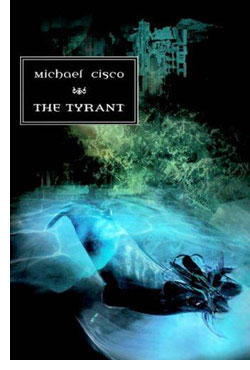The Tyrant
Michael Cisco
Prime Books
US Hardcover First
ISBN 0-894-81585-8
Publication Date: 11-01-2003
250 Pages; $29.95
Date Reviewed: 01-19-2004
Reviewed by: Rick Kleffel © 2004

REFERENCES
COLUMNS
|
|
|
The TyrantMichael CiscoPrime BooksUS Hardcover FirstISBN 0-894-81585-8Publication Date: 11-01-2003250 Pages; $29.95Date Reviewed: 01-19-2004Reviewed by: Rick Kleffel © 2004 |
|
|
REFERENCES |
COLUMNS |
Writing transforms this world. The work itself is added to the catalogue of the world, and within the work, the world is reflected sometimes badly, sometimes madly. Writing is a mirror built with words, capable of reflecting that which does not and cannot exist, of intermingling that which is with that which isn't. But the humdrum reality of it is such that most writing takes on an ordinary aspect, becomes simply another part of the world, neither a world in itself nor a mirror of ours. It's all in the word choice. There is great prose that takes us back to our reality, and there's great prose that takes us beyond. The great virtue acceded to most modern writers is prose that is "transparent." And while it is a virtue, it is not the only virtue. To reflect that which is not, you don't need transparency. You need opacity, language to build a world, bold brushstrokes to create something from nothing. It's vision beyond death.
Ella is a 15-yeal old girl crippled by polio, a genius taking graduate courses in biology and demonstrating a strong talent for working with ectoplasm. She journeys beyond death in Michael Cisco's visionary novel 'The Tyrant'. Taken as an assistant to the famed Dr. Belhoria, she'll be helping Doctor Belhoria in her study of a talented young epileptic man as he descends into a trance which will take him to the Underworld.
Cisco's prose is beyond opacity. It has a palpable density, which is apparent from beginning to end. Thus, it will take the reader a while to realize that the world within which Ella's tale unfolds is decidedly not ours. It is a Gothic, science-fictional mutant, lush, luxuriant with imagination, roots wrapped around the industrial detritus of our rotted inner-city slums. By the time you realize that you're not in the familiar world, the familiar world itself has been transformed by Cisco's prose. It's a remarkable feat as well as an interesting technique.
Of course, not all readers will take to Cisco's prose style. Written in an acid rush of imagery, 'The Tyrant' streams off the page and beyond boundaries set by normal punctuation. For most readers it will require an effort to slip the bonds of normal storytelling and immerse themselves in Cisco's grand vision. It's like emptying your lungs of air to breathe liquid air. You can do it; you used to do it. And once you do, the immersion is total and intense.
Cisco does nothing less in 'The Tyrant' than explore the world in a manner reminiscent of Dante in 'The Inferno'. When the reader is not ensnared in Cisco's science-fiction mutation of reality, the reader is immersed in Cisco's visionary version of the afterlife. Doctor Belhoria makes a fateful decision to unleash her experimental subject, and in so doing, he becomes more than a voyager in the after-life. He becomes, the Tyrant, the conqueror of lands usually outside the descriptive talents of writers -- Hell, then Heaven. Cisco carries this off spectacularly, describing nightmare armies of the dead crawling, riding, screaming through the reader's consciousness.
But just when the readers might drown in Cisco's evocative imagery, he ups the ante, returns to his unreal real world and slings the plot around the gravity well of his underworld, into another realm of unworldly, Fortean events. The Tyrant's activities in the underworld have reverberations in Cisco's Sfnal surreality. Ella embarks on a journey around the country and beyond, occasionally encountering sigils that are actually familiar to the reader. The effect is remarkable. Cisco's plot is every bit as luxuriant as his prose.
As novels go, 'the Tyrant' is packed with enough imagery for several normal books. There are so many memorable descriptions within that you'll want to jot down your favorites. Cisco excels at all levels; whether he's describing an insightful character moment or unfurling an army of the dead across a planet of chaos, he will plant the proper specifics with music and breathtaking skill. Not a page goes by without a significant display of literary virtuosity. While this doesn't make for reading easy, it does make it enjoyable -- if you're inclined to enjoy literary skills at the level that Cisco reaches for and achieves. The level of unreality, the level of intensity, are not for all readers. But Cisco's work is pretty clearly identifiable as such. You'll know if this is to your taste. And if you think it might be, but are unsure, it's well worth the risk.
That's because Cisco is that best of writers, the risk-taker. He doesn't just risk once in his work. His entire work is a gamble, a quid pro quo deal wherein he offers the readers a guaranteed-to-be-spectacular level of writing and the reader offers him in return the patience of the saints. Cisco is beyond brilliant. He starts where normal brilliant ends, and forges his own path in the wilderness of the unknown. It would be remiss to ignore the fine package that Prime Books puts this novel in. The surreal cover art by Harry Morris and the nice binding and printing give it the heft required to carry off Cisco's audacious work. You may not like it, but you will love it. You may not understand it, but you will experience it. 'The Tyrant' is not like anything else out there. It's the world transformed, horror fiction transformed, the butterfly to horror's caterpillar. It's possible you'll overdose on Cisco's work. But you'll have a hell of a good time dying.